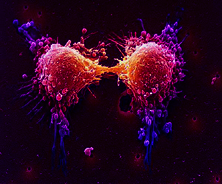HAMLET, A New Addition to Anti-Cancer Arsenal

Scientists have managed to gain some ground in the war against cancer by developing a new weapon to use against the enemy. The new weapon in question goes by the name HAMLET and it is designed by a team of scientists from Nanyang Tehnological University (NTU), Singapore and Lund University of Sweden.
HAMLET stands for Human Alpha-lactabumin Made Lethal to Tumor Cells. It is composed of a natural protein present in human breast milk, known to have strong and wide ranging tumor killing properties when bound to certain lipids. HAMLET’s anti tumor properties are attributed to specific components known as peptide-oleate bound forms.
HAMLET has been observed to attack and neutralize only the tumor cells, leaving the surrounding healthy cells intact and it is found to suppress colon cancer in lab mice. In this study, genetically modified lab mice designed to develop colon cancer were fed HAMLET laced water and it was observed that most of these mice did not develop tumors, leading to the conclusion that the emerging tumor cells were being destroyed faster than they could grow and proliferate.
Backed by the successful study, whose results are published in two of the well known scientific journals, viz. Gut and PLoS ONE, the researchers are now in the process of further identifying new key components of the natural protein in order to create synthetic peptides with HAMLET”s properties while being more resilient than the original protein complex. They want the synthetic HAMLET peptide to be able to survive the different environments it is bound to encounter when administered orally and target the tumor cells successfully.
HAMLET will undergo clinical trials soon as a therapeutic and preventive agent against colon cancer in families with genetic predisposition to colon cancer. Upon successful completion of clinical trials, they plan to make it commercially available.
Source: Nanyang Tehnological University

